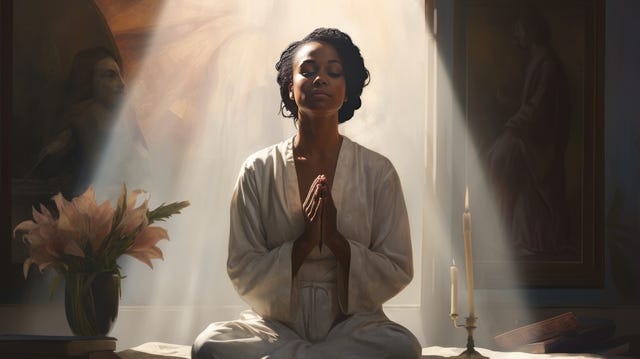Church on Sunday, Judgement on Monday
The Hypocrisy of Church Folk
When it comes to the Black church—and I’m sure this applies to other communities as well but these are just my experiences and what I’ve witnessed. Now, let's get into it. There’s no doubt that the Black church has a deep-rooted history of strength, resilience, and faith that has held families together for generations. However, let’s be real—there’s another side to this story that often gets swept under the rug. The hypocrisy we sometimes witness in these church spaces can be downright discouraging.
Many of us have seen it firsthand that people who praise God on Sunday but tear each other down from Monday through Saturday. Some churchgoers are quick to judge others for their life choices while conveniently ignoring the skeletons in their own closets. The whispers during service, the side-eyes, and looking over the rim of glasses while waving a little church fan can make church feel like the last place you'd want to go for real support.
We’re taught that the church is a sanctuary, a place for healing, redemption, and community. But what happens when the church becomes a source of shame, exclusion, or hurt? Too often those who should offer love and guidance instead become gatekeepers, and deciding who is "worthy" of acceptance based on some arbitrary standards. And the irony? These same people once had to find their way too. They weren’t always so "sanctified." They also had to learn and grow in their faith. So, are they truly doing right by others?
Let me be clear I’m not here to discredit the true followers of Christ, the universe, or whatever spiritual practice you hold dear. There are countless of church members doing the real work as far as saving souls, transforming lives, and leading people to a better place. Bless you all, but the double standards can be particularly harmful within the Black community, where the church often shapes not just faith but also identity, values, and social connections.
We must acknowledge that this kind of hypocrisy isn’t unique to the Black church, but the cultural significance and the central role the church plays in Black life makes it hit differently. We expect more from a place that has historically been our refuge and stronghold through centuries of struggle. But those judgmental attitudes, gossipy whispers, and holier-than-thou personas can create divides, not unity.
How can those who ask for grace and mercy offer none to others? How can the “mothers of the church”, or our elders, set a non-judgmental example for younger generations if they’re constantly scolding and criticizing? If people come to the church seeking salvation but are met with judgment, how can we expect to win souls? When someone is already struggling with strongholds, and yes, we all have something that we struggle with, but when it is a struggle to even make it through the church doors, feeling defeated and broken, how is scolding them going to help? It doesn’t. It results in lost souls and people walk away from faith altogether because they feel judged rather than supported. Some do not have faith or trust in the church for this very reason.
A lot of older "church folk" are stuck—stuck in traditions that may have worked back in the day but don’t necessarily apply in the same way now. Times change, people evolve, and so must the church’s approach. People receive things differently today. Worship, prayer, and spirituality look different now for many people, and that’s okay. If someone isn’t “ready for the Lord’s coming” or hasn’t quite found their spiritual groove yet, why can’t we just pray for them, hope for their growth, and still love them as they are? Everyone finds peace in their own time.
What we need are spaces where we can be our authentic selves without fear of judgment. Spaces where we can be flawed, messy, and still be a work in progress. We need more church communities centered on love, empathy, and walking with people through their struggles rather than condemning them for falling short.
This isn’t to say that the church is inherently bad—it’s a sacred institution that has the power to be transformative. But the judgment and hypocrisy many experiences can push people away from a place that should be lifting them up. It’s time we address these issues openly, reclaim what the church is meant to be, and hold each other accountable in ways that uplift rather than tear down.
"Let the one who has never sinned throw the first stone." — John 8:7
Question: How do we create a space in the church that is truly welcoming, free of judgment, and full of love, especially for those who have been hurt by church hypocrisy?
With love and empowerment - E
#ChurchHypocrisy #BlackChurchRealTalk #EmpowerSisterhoodOneStoryAtATime




Amen 🙏🏽